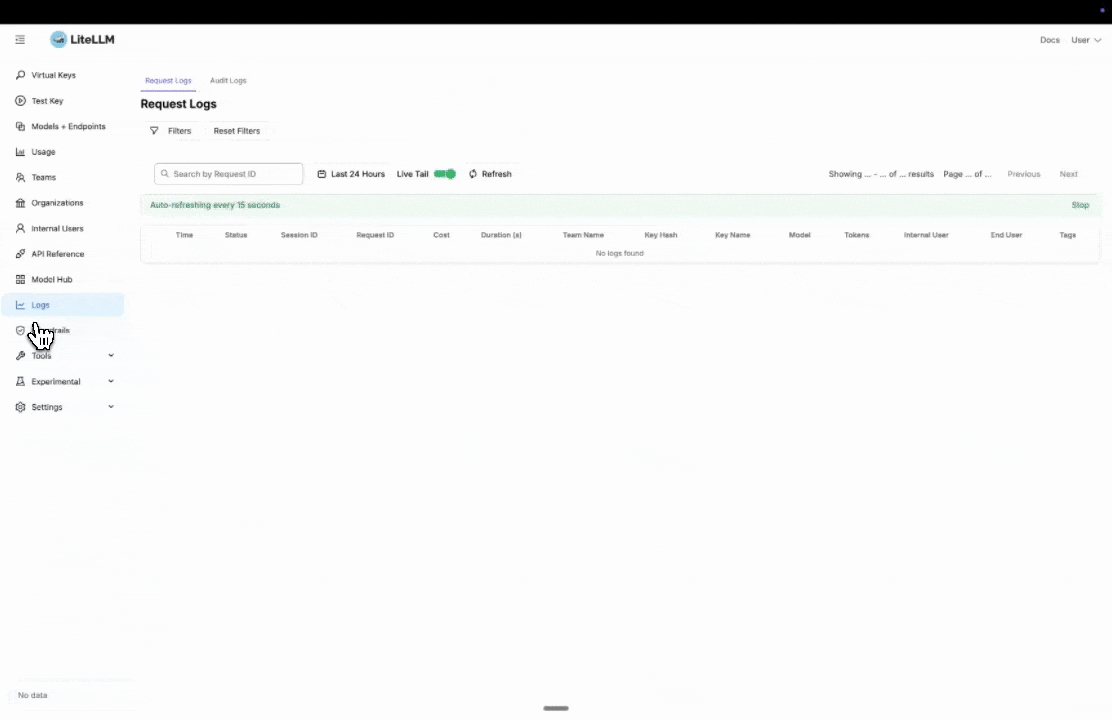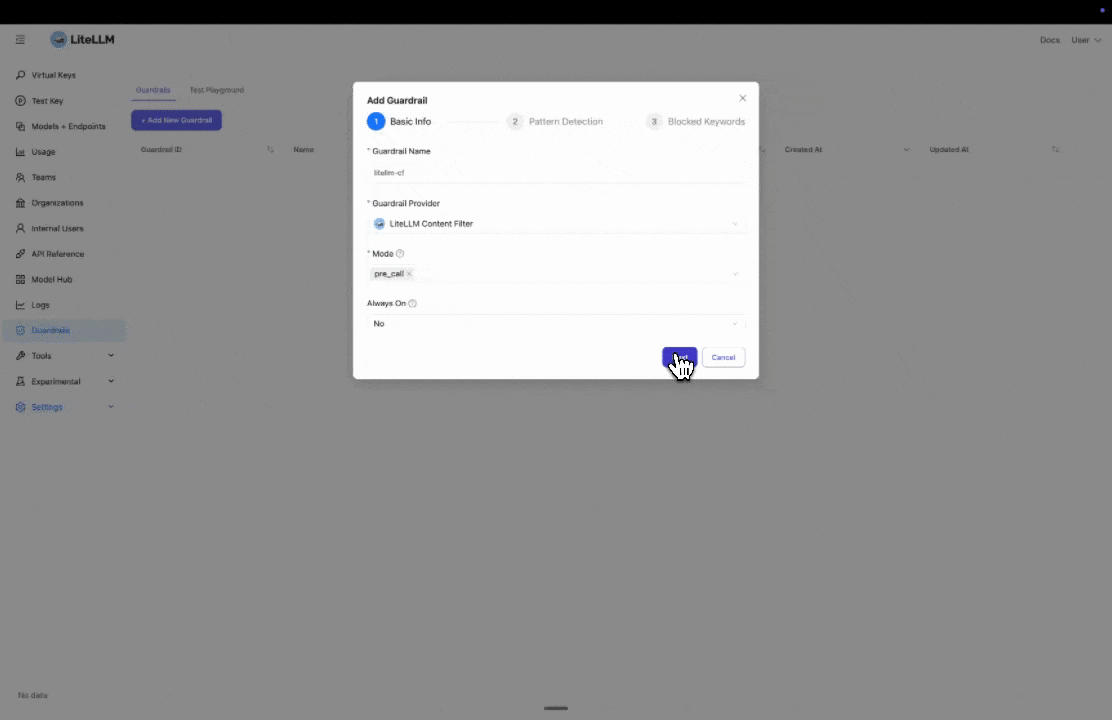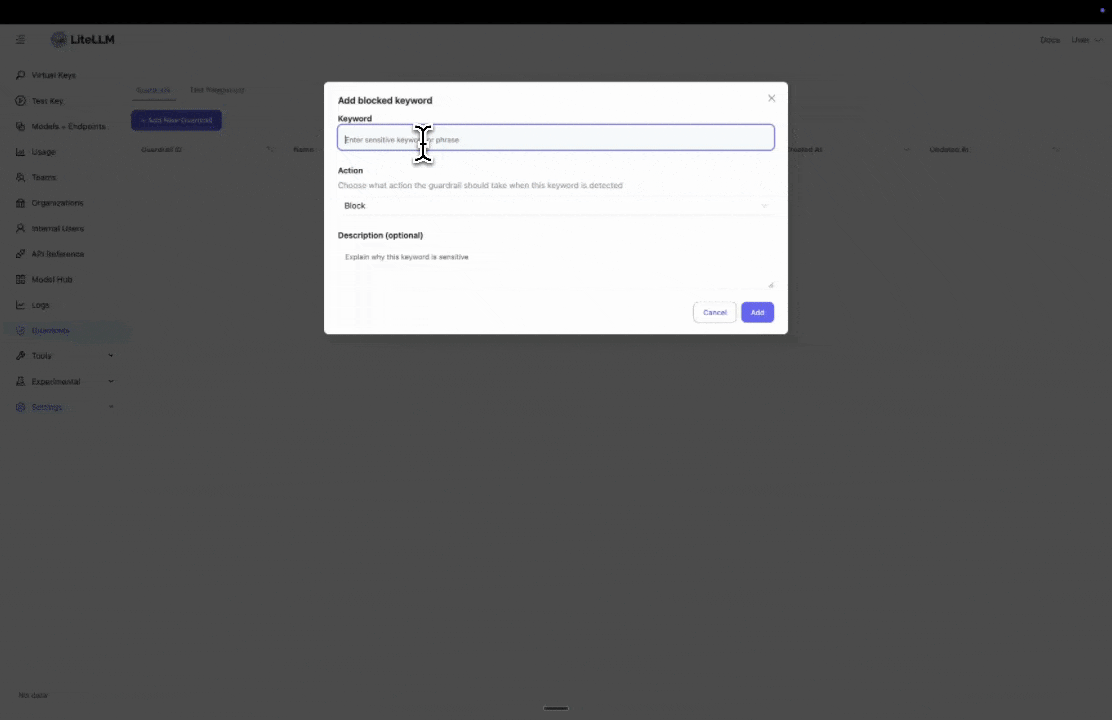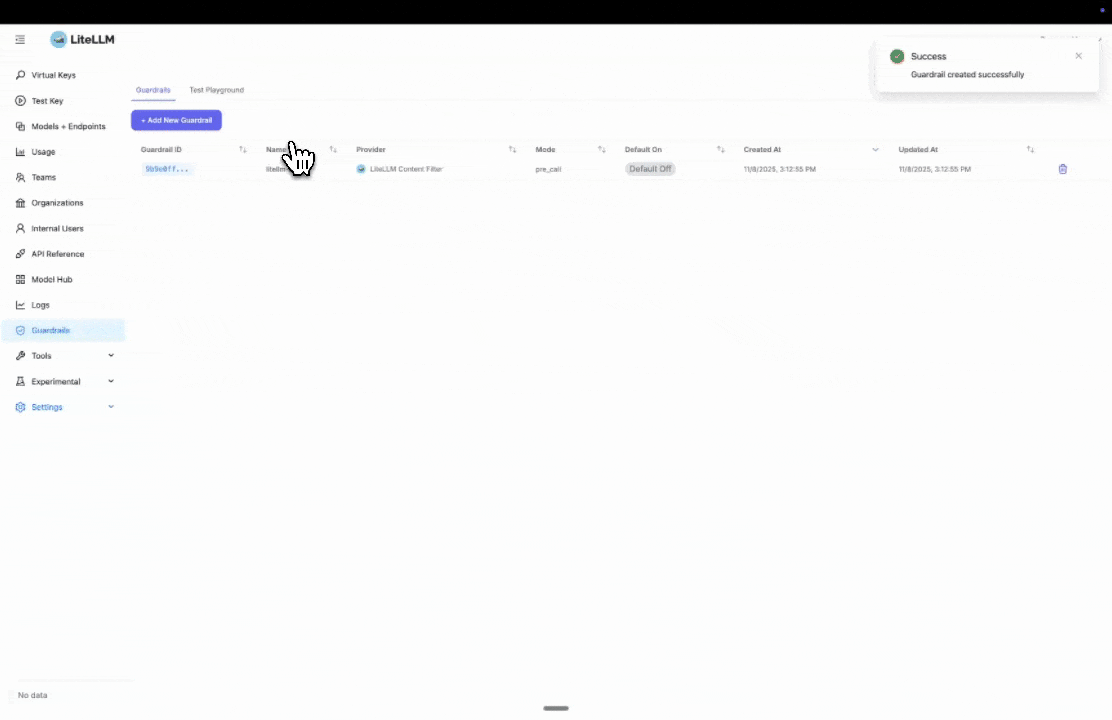LiteLLM Content Filter (Built-in Guardrails)
Built-in guardrail for detecting and filtering sensitive information using regex patterns and keyword matching. No external dependencies required.
When to use? Good for cases which do not require an ML model to detect sensitive information.
Overview
| Property | Details |
|---|---|
| Description | On-device guardrail for detecting and filtering sensitive information using regex patterns and keyword matching. Built into LiteLLM with no external dependencies. |
| Guardrail Name | litellm_content_filter |
| Detection Methods | Prebuilt regex patterns, custom regex, keyword matching |
| Actions | BLOCK (reject request), MASK (redact content) |
| Supported Modes | pre_call, post_call, during_call (streaming) |
| Performance | Fast - runs locally, no external API calls |
Quick Start
LiteLLM UI
Step 1: Select LiteLLM Content Filter
Click "Add New Guardrail" and select "LiteLLM Content Filter" as your guardrail provider.

Step 2: Configure Pattern Detection
Select the prebuilt entities you want to block or mask. In this example, we select "Email" to detect and block email addresses.
If you need to block a custom entity, you can add a custom regex pattern by clicking "Add custom regex".

Step 3: Add Blocked Keywords
Enter specific keywords you want to block. This is useful if you have policies to block certain words or phrases.

Step 4: Test Your Guardrail
After creating the guardrail, navigate to "Test Playground" to test it. Select the guardrail you just created.
Test examples:
- Blocked keyword test: Entering "hi blue" will trigger the block since we set "blue" as a blocked keyword
- Pattern detection test: Entering "Hi ishaan@berri.ai" will trigger the email pattern detector

LiteLLM Config.yaml Setup
Step 1: Define Guardrails in config.yaml
- Harmful Content Detection
- PII Protection
- Combined
model_list:
- model_name: gpt-3.5-turbo
litellm_params:
model: openai/gpt-3.5-turbo
api_key: os.environ/OPENAI_API_KEY
guardrails:
- guardrail_name: "harmful-content-filter"
litellm_params:
guardrail: litellm_content_filter
mode: "pre_call"
# Enable harmful content categories
categories:
- category: "harmful_self_harm"
enabled: true
action: "BLOCK"
severity_threshold: "medium"
- category: "harmful_violence"
enabled: true
action: "BLOCK"
severity_threshold: "medium"
- category: "harmful_illegal_weapons"
enabled: true
action: "BLOCK"
severity_threshold: "medium"
model_list:
- model_name: gpt-3.5-turbo
litellm_params:
model: openai/gpt-3.5-turbo
api_key: os.environ/OPENAI_API_KEY
guardrails:
- guardrail_name: "content-filter-pre"
litellm_params:
guardrail: litellm_content_filter
mode: "pre_call"
# Prebuilt patterns for common PII
patterns:
- pattern_type: "prebuilt"
pattern_name: "us_ssn"
action: "BLOCK"
- pattern_type: "prebuilt"
pattern_name: "email"
action: "MASK"
# Custom blocked keywords
blocked_words:
- keyword: "confidential"
action: "BLOCK"
description: "Sensitive internal information"
model_list:
- model_name: gpt-3.5-turbo
litellm_params:
model: openai/gpt-3.5-turbo
api_key: os.environ/OPENAI_API_KEY
guardrails:
- guardrail_name: "comprehensive-filter"
litellm_params:
guardrail: litellm_content_filter
mode: "pre_call"
# Harmful content categories
categories:
- category: "harmful_violence"
enabled: true
action: "BLOCK"
severity_threshold: "high"
# PII patterns
patterns:
- pattern_type: "prebuilt"
pattern_name: "us_ssn"
action: "BLOCK"
- pattern_type: "prebuilt"
pattern_name: "email"
action: "MASK"
# Custom keywords
blocked_words:
- keyword: "confidential"
action: "BLOCK"
Step 2: Start LiteLLM Gateway
litellm --config config.yaml
Step 3: Test Request
- SSN Blocked
- Email Masked
curl -i http://localhost:4000/v1/chat/completions \
-H "Content-Type: application/json" \
-H "Authorization: Bearer sk-1234" \
-d '{
"model": "gpt-3.5-turbo",
"messages": [
{"role": "user", "content": "My SSN is 123-45-6789"}
],
"guardrails": ["content-filter-pre"]
}'
Response: HTTP 400 Error
{
"error": {
"message": {
"error": "Content blocked: us_ssn pattern detected",
"pattern": "us_ssn"
},
"code": "400"
}
}
curl -i http://localhost:4000/v1/chat/completions \
-H "Content-Type: application/json" \
-H "Authorization: Bearer sk-1234" \
-d '{
"model": "gpt-3.5-turbo",
"messages": [
{"role": "user", "content": "Contact me at john@example.com"}
],
"guardrails": ["content-filter-pre"]
}'
The request is sent to the LLM with the email masked:
Contact me at [EMAIL_REDACTED]
Configuration
Supported Modes
pre_call- Run before LLM call, filters input messagespost_call- Run after LLM call, filters output responsesduring_call- Run during streaming, filters each chunk in real-time
Actions
BLOCK- Reject the request with HTTP 400 errorMASK- Replace sensitive content with redaction tags (e.g.,[EMAIL_REDACTED])
Prebuilt Patterns
Available Patterns
| Pattern Name | Description | Example |
|---|---|---|
us_ssn | US Social Security Numbers | 123-45-6789 |
email | Email addresses | user@example.com |
phone | Phone numbers | +1-555-123-4567 |
visa | Visa credit cards | 4532-1234-5678-9010 |
mastercard | Mastercard credit cards | 5425-2334-3010-9903 |
amex | American Express cards | 3782-822463-10005 |
aws_access_key | AWS access keys | AKIAIOSFODNN7EXAMPLE |
aws_secret_key | AWS secret keys | wJalrXUtnFEMI/K7MDENG/bPxRfi... |
github_token | GitHub tokens | example-github-token-123 |
Using Prebuilt Patterns
guardrails:
- guardrail_name: "pii-filter"
litellm_params:
guardrail: litellm_content_filter
mode: "pre_call"
patterns:
- pattern_type: "prebuilt"
pattern_name: "us_ssn"
action: "BLOCK"
- pattern_type: "prebuilt"
pattern_name: "email"
action: "MASK"
- pattern_type: "prebuilt"
pattern_name: "aws_access_key"
action: "BLOCK"
Custom Regex Patterns
Define your own regex patterns for domain-specific sensitive data:
guardrails:
- guardrail_name: "custom-patterns"
litellm_params:
guardrail: litellm_content_filter
mode: "pre_call"
patterns:
# Custom employee ID format
- pattern_type: "regex"
pattern: '\b[A-Z]{3}-\d{4}\b'
name: "employee_id"
action: "MASK"
# Custom project code format
- pattern_type: "regex"
pattern: 'PROJECT-\d{6}'
name: "project_code"
action: "BLOCK"
Keyword Filtering
Block or mask specific keywords:
guardrails:
- guardrail_name: "keyword-filter"
litellm_params:
guardrail: litellm_content_filter
mode: "pre_call"
blocked_words:
- keyword: "confidential"
action: "BLOCK"
description: "Internal confidential information"
- keyword: "proprietary"
action: "MASK"
description: "Proprietary company data"
- keyword: "secret_project"
action: "BLOCK"
Loading Keywords from File
For large keyword lists, use a YAML file:
guardrails:
- guardrail_name: "keyword-file-filter"
litellm_params:
guardrail: litellm_content_filter
mode: "pre_call"
blocked_words_file: "/path/to/sensitive_keywords.yaml"
blocked_words:
- keyword: "project_apollo"
action: "BLOCK"
description: "Confidential project codename"
- keyword: "internal_api"
action: "MASK"
description: "Internal API references"
- keyword: "customer_database"
action: "BLOCK"
description: "Protected database name"
Streaming Support
Content filter works with streaming responses by checking each chunk:
guardrails:
- guardrail_name: "streaming-filter"
litellm_params:
guardrail: litellm_content_filter
mode: "during_call" # Check each streaming chunk
patterns:
- pattern_type: "prebuilt"
pattern_name: "email"
action: "MASK"
import openai
client = openai.OpenAI(
api_key="sk-1234",
base_url="http://localhost:4000"
)
response = client.chat.completions.create(
model="gpt-3.5-turbo",
messages=[{"role": "user", "content": "Tell me about yourself"}],
stream=True,
extra_body={"guardrails": ["streaming-filter"]}
)
for chunk in response:
print(chunk.choices[0].delta.content)
# Emails automatically masked in real-time
Image Content Filtering
Content filter can analyze images by generating descriptions and applying filters to the text descriptions.
This can introduce significant latency to the request - depending on the speed of the vision-capable model.
This is because, each request containing images will be sent to the vision-capable model to generate a description.
Configuration
model_list:
- model_name: gpt-4-vision
litellm_params:
model: openai/gpt-4-vision-preview
api_key: os.environ/OPENAI_API_KEY
guardrails:
- guardrail_name: "image-filter"
litellm_params:
guardrail: litellm_content_filter
mode: "pre_call"
image_model: "gpt-4-vision" # value is `model_name` of the vision-capable model
# Apply same filters to image descriptions
categories:
- category: "harmful_violence"
enabled: true
action: "BLOCK"
severity_threshold: "medium"
patterns:
- pattern_type: "prebuilt"
pattern_name: "email"
action: "MASK"
How It Works
- Image is sent to the vision model to generate a text description
- Content filters are applied to the description
- If harmful content is detected, request is blocked with context about the image
Example:
import openai
client = openai.OpenAI(
api_key="sk-1234",
base_url="http://localhost:4000"
)
response = client.chat.completions.create(
model="gpt-4-vision",
messages=[{
"role": "user",
"content": [
{"type": "text", "text": "What's in this image?"},
{"type": "image_url", "image_url": {"url": "https://example.com/image.jpg"}}
]
}],
extra_body={"guardrails": ["image-filter"]}
)
If the image description contains filtered content, you'll get:
{
"error": "Content blocked: harmful_violence category keyword 'weapon' detected (severity: high) (Image description): The image shows..."
}
Customizing Redaction Tags
When using the MASK action, sensitive content is replaced with redaction tags. You can customize how these tags appear.
Default Behavior
Patterns: Each pattern type gets its own tag based on the pattern name
Input: "My email is john@example.com and SSN is 123-45-6789"
Output: "My email is [EMAIL_REDACTED] and SSN is [US_SSN_REDACTED]"
Keywords: All keywords use the same generic tag
Input: "This is confidential and proprietary information"
Output: "This is [KEYWORD_REDACTED] and [KEYWORD_REDACTED] information"
Customizing Tags
Use pattern_redaction_format and keyword_redaction_tag to change the redaction format:
guardrails:
- guardrail_name: "custom-redaction"
litellm_params:
guardrail: litellm_content_filter
mode: "pre_call"
pattern_redaction_format: "***{pattern_name}***" # Use {pattern_name} placeholder
keyword_redaction_tag: "***REDACTED***"
patterns:
- pattern_type: "prebuilt"
pattern_name: "email"
action: "MASK"
- pattern_type: "prebuilt"
pattern_name: "us_ssn"
action: "MASK"
blocked_words:
- keyword: "confidential"
action: "MASK"
Output:
Input: "Email john@example.com, SSN 123-45-6789, confidential data"
Output: "Email ***EMAIL***, SSN ***US_SSN***, ***REDACTED*** data"
Key Points:
pattern_redaction_formatmust include{pattern_name}placeholder- Pattern names are automatically uppercased (e.g.,
email→EMAIL) keyword_redaction_tagis a fixed string (no placeholders)
Content Categories
Prebuilt categories use keyword matching to detect harmful content, bias, and inappropriate advice. Keywords are matched with word boundaries (single words) or as substrings (multi-word phrases), case-insensitive.
Available Categories
| Category | Description |
|---|---|
| Harmful Content | |
harmful_self_harm | Self-harm, suicide, eating disorders |
harmful_violence | Violence, criminal planning, attacks |
harmful_illegal_weapons | Illegal weapons, explosives, dangerous materials |
| Bias Detection | |
bias_gender | Gender-based discrimination, stereotypes |
bias_sexual_orientation | LGBTQ+ discrimination, homophobia, transphobia |
bias_racial | Racial/ethnic discrimination, stereotypes |
bias_religious | Religious discrimination, stereotypes |
| Denied Advice | |
denied_financial_advice | Personalized financial advice, investment recommendations |
denied_medical_advice | Medical advice, diagnosis, treatment recommendations |
denied_legal_advice | Legal advice, representation, legal strategy |
Bias detection is complex and context-dependent. Rule-based systems catch explicit discriminatory language but may generate false positives on legitimate discussions. Start with high severity thresholds and test thoroughly. For mission-critical bias detection, consider combining with AI-based guardrails (e.g., HiddenLayer, Lakera).
Configuration
guardrails:
- guardrail_name: "content-filter"
litellm_params:
guardrail: litellm_content_filter
mode: "pre_call"
categories:
- category: "harmful_self_harm"
enabled: true
action: "BLOCK"
severity_threshold: "medium" # Blocks medium+ severity
- category: "bias_gender"
enabled: true
action: "BLOCK"
severity_threshold: "high" # Only explicit discrimination
- category: "denied_financial_advice"
enabled: true
action: "BLOCK"
severity_threshold: "medium"
Severity Thresholds:
"high"- Only blocks high severity items"medium"- Blocks medium and high severity (default)"low"- Blocks all severity levels
Custom Category Files
Override default categories with custom keyword lists:
categories:
- category: "harmful_self_harm"
enabled: true
action: "BLOCK"
severity_threshold: "medium"
category_file: "/path/to/custom.yaml"
category_name: "harmful_self_harm"
description: "Custom self-harm detection"
default_action: "BLOCK"
keywords:
- keyword: "suicide"
severity: "high"
- keyword: "harm myself"
severity: "high"
exceptions:
- "suicide prevention"
- "mental health"
Use Cases
1. Harmful Content Detection
Block or detect requests containing harmful, illegal, or dangerous content:
categories:
- category: "harmful_self_harm"
enabled: true
action: "BLOCK"
severity_threshold: "medium"
- category: "harmful_violence"
enabled: true
action: "BLOCK"
severity_threshold: "high"
- category: "harmful_illegal_weapons"
enabled: true
action: "BLOCK"
severity_threshold: "medium"
2. Bias and Discrimination Detection
Detect and block biased, discriminatory, or hateful content across multiple dimensions:
categories:
# Gender-based discrimination
- category: "bias_gender"
enabled: true
action: "BLOCK"
severity_threshold: "medium"
# LGBTQ+ discrimination
- category: "bias_sexual_orientation"
enabled: true
action: "BLOCK"
severity_threshold: "medium"
# Racial/ethnic discrimination
- category: "bias_racial"
enabled: true
action: "BLOCK"
severity_threshold: "high" # Only explicit to reduce false positives
# Religious discrimination
- category: "bias_religious"
enabled: true
action: "BLOCK"
severity_threshold: "medium"
Sensitivity Tuning:
For bias detection, severity thresholds are critical to balance safety and legitimate discourse:
# Conservative (low false positives, may miss subtle bias)
categories:
- category: "bias_racial"
severity_threshold: "high" # Only blocks explicit discriminatory language
# Balanced (recommended)
categories:
- category: "bias_gender"
severity_threshold: "medium" # Blocks stereotypes and explicit discrimination
# Strict (high safety, may have more false positives)
categories:
- category: "bias_sexual_orientation"
severity_threshold: "low" # Blocks all potentially problematic content
3. PII Protection
Block or mask personally identifiable information before sending to LLMs:
patterns:
- pattern_type: "prebuilt"
pattern_name: "us_ssn"
action: "BLOCK"
- pattern_type: "prebuilt"
pattern_name: "email"
action: "MASK"
2. Credential Detection
Prevent API keys and secrets from being exposed:
patterns:
- pattern_type: "prebuilt"
pattern_name: "aws_access_key"
action: "BLOCK"
- pattern_type: "prebuilt"
pattern_name: "github_token"
action: "BLOCK"
3. Sensitive Internal Data Protection
Block or mask references to confidential internal projects, codenames, or proprietary information:
blocked_words:
- keyword: "project_titan"
action: "BLOCK"
description: "Confidential project codename"
- keyword: "internal_api"
action: "MASK"
description: "Internal system references"
For large lists of sensitive terms, use a file:
blocked_words_file: "/path/to/sensitive_terms.yaml"
4. Safe AI for Consumer Applications
Combining harmful content and bias detection for consumer-facing AI:
guardrails:
- guardrail_name: "safe-consumer-ai"
litellm_params:
guardrail: litellm_content_filter
mode: "pre_call"
categories:
# Harmful content - strict
- category: "harmful_self_harm"
enabled: true
action: "BLOCK"
severity_threshold: "medium"
- category: "harmful_violence"
enabled: true
action: "BLOCK"
severity_threshold: "medium"
# Bias detection - balanced
- category: "bias_gender"
enabled: true
action: "BLOCK"
severity_threshold: "high" # Avoid blocking legitimate gender discussions
- category: "bias_sexual_orientation"
enabled: true
action: "BLOCK"
severity_threshold: "medium"
- category: "bias_racial"
enabled: true
action: "BLOCK"
severity_threshold: "high" # Education and news may discuss race
Perfect for:
- Chatbots and virtual assistants
- Educational AI tools
- Customer service AI
- Content generation platforms
- Public-facing AI applications
5. Compliance
Ensure regulatory compliance by filtering sensitive data types:
# Categories checked first (high priority)
# Category keywords are matched first
categories:
- category: "harmful_self_harm"
severity_threshold: "high"
# Then regex patterns
patterns:
- pattern_type: "prebuilt"
pattern_name: "visa"
action: "BLOCK"
- pattern_type: "prebuilt"
pattern_name: "us_ssn"
action: "BLOCK"